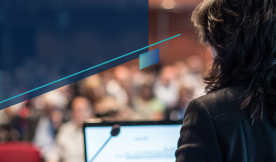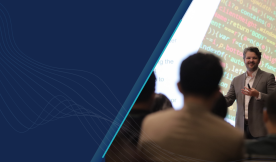Smart Cities, Clean Water, and Solving the Climate Crisis: a Q&A with Rituparna Das of Hydrotec Solutions
Rituparna Das was selected for the GIST Business Incubation program’s first cohort of innovators. The 2019 GIST Business Incubation program provided entrepreneurs with exposure to the U.S. market and startup resources. While in residence with the program, participants worked on refining their ideas, building their business plans, and finding the right market for their product.
This conversation between Rituparna Das and VentureWell’s Genesis Lodise was conducted on 9 February, 2021 and was edited for clarity. VentureWell is the GIST initiative’s primary implementing partner.
GIST: Rituparna Das! I’m so excited to reconnect again with you. It’s been over a year since we last spoke when you were part of the GIST Business Incubation program that came to the U.S.
Rituparna Das: Yes, it’s great to talk to you again! Especially after this long, difficult time. Thankfully here in India we are getting back to normal a bit. Some offices are opening. We have very quickly vaccinated 3-4 million people but we have 1.3 billion in the country. We still have a long way to go.
GIST: I know we spoke about this when we were both in Washington D.C. in 2019 but can you tell us a bit about your startup, Hydrotec Solutions, and the product that you've developed, and what the issue is that your product solves?
RD: Hydrotec Solutions is a social enterprise which has a mission of solving the drinking water crisis that the whole world faces. We want to make clean drinking water accessible, affordable, and available for all. We do that with our Arosia water kiosks.
GIST: How long have you been working on this? When was Hydrotec Solutions born?
RD: This year it will have been seven years since we started work on our solution.
GIST: How long did it take to get your first product out to an actual customer who could start using it?
RD: We spent our first year doing research and development. Then another year building the MVP and then we started building our prototype. Once we had the prototype we could start presenting to potential customers. But even before that, one of our founders had to be full time. So, after three and a half years, I became the first full time person at that company. Just now, though, in the last few months we have received a lot of projects--totalling around $1 million USD.
GIST: Congratulations! Water quality is still a huge issue for many people around the world. How did you personally come to this realization and when did you decide to do something about it?
RD: When I was studying in college, many of the students were frequently falling ill and we did not know the reason. It was so frequent that some of us were ending up at hospitals. We were told the cause was in the drinking water and that we should drink only packaged water. Not only was that solution unaffordable for many but it was a huge environmental issue.
Years later, after I had started my career as a software engineer, I would hear about the same issues from our new, younger team members. The issue was still affecting people! At this point I was working on projects that required real time monitoring of various things and I thought, “Why not develop a similar product that helps to solve the drinking water issue?”
The other co-founder of Hydrotec Solutions was working at a water tech company in India so he had a very good working knowledge of water technology. So we put our monitoring software and water tech backgrounds together to create this solution. But we also needed our third co-founder. She was an MBA and really knew the business side of running a startup.
GIST: That’s a really personal and compelling experience. And a great reason to take the leap into entrepreneurship. You were working as a software engineer before Hyrdotec. Was it difficult changing your mindset from being a software engineer and working for someone else to being an entrepreneur?
RD: Yeah, definitely. It was a very big transition. Initially, we did not even tell our parents that we were developing this startup. They would have been too worried.
GIST: Worried about what part?
RD: Worried about us failing at it. But for me, it was not about success or failure at all. Deep inside, I needed to be able to look back on my work and feel good about it. That’s what I was thinking. This has been such a great learning experience--how to use the sensors in our kiosk, how to make the project viable, how to make it compact, understanding what the customer wants, the whole customer interaction part.
GIST: That’s a huge benefit of the startup process, getting to really understand product development. What types of resources did you draw on to help you along the way?
RD: I had a lot of good mentors. I used to discuss with them what I was doing and they really helped me with the first version of the product. In those first years after launching our startup we really bootstrapped. We would still work our regular jobs during the day and then work on our startup in the evenings. That is where we developed our first, small prototype. We were fortunate that our prototype received interest from the government and we were asked by the army to install a water purification and quality monitoring unit in a remote town. The one thing we didn’t anticipate was that the town suffered from frequent power outages. So, we had to adapt our product to be able to still function even when the electricity went out. We did that by integrating solar panels and a rechargeable battery system into the unit. The whole unit is self sustaining. And it also provides the army headquarters with a report regarding the quality of the water, how much water has been dispensed, and how much money is being collected, so it has become a sustainable model for them as well. That was four years ago and the unit is still running.
GIST: So impressive! It’s great when you build something and not only does it work, it actually lasts! That is also a great story of how you developed a product to address a specific need and then added other features to it as your understanding of the customer’s needs expanded. Has that allowed you to introduce the product into other markets?
RD: Yes! It was then placed into tourist destinations where plastic waste was a very big headache for government officials. Since we had the support of the Indian government, we could then focus on making it into a more robust product. We did more research and development and made a more compact version--a plug and play device--that could be placed anywhere, like inside buildings, or outside a building, in a hospital, in a park, everywhere. After these improvements we got orders from lots of Smart Cities in India. The government really likes the IoT aspect of the product that enables them to see the functioning of the machine, the quality of the water, while sitting in an office a thousand kilometers away. We even enabled triggers that send alerts when certain water quality issues are detected.
GIST: That's an incredible story. You just went from working in a different industry as a software engineer to getting an idea based on something that you had experienced yourself, and then you started to develop this on the side. You were able put together a prototype, test it in the field, with a real customer, and see the customer had all these additional needs that you were then able to integrate into an even better product that had even more appeal to a wider customer base.
RD: Yes!
GIST: Now that you have your first customers and are selling products, what plans for growth does Hydrotec have? What new possibilities have you discovered?
RD: Just 150 kilometers away from Kolkata, where we are based, there are places that do not have water supply connections at all. People have to walk four kilometres just to fetch water. This is an issue that we looked at and decided we needed to solve. Laying pipes across such huge distances is very difficult in India. So our idea is to set up our self-contained kiosks that would pull water directly out of the ground from underground wells. That would bring safe drinking water to an incredible amount of people.
Before COVID we had started connecting with a number of NGOs who were working in these areas in the hopes of partnering. Many people think it is too big of a challenge to get clean water to the number of people we are trying to help. But that is our vision. And if we can solve that problem for such a huge part of the population, we should not be bothered with what other people think. So we went ahead and just did it.
GIST: Can you explain what “Smart Cities” are in India. You’ve referred to them a few times.
RD: Yes, the government in India has chosen one hundred cities to introduce sustainable practices like green energy and sustainable clean water. They are smart in the sense that the government wants a lot of IoT enabled aspects in the cities. Our kiosks fit both of those goals. But there are other areas like smart parking to show you parking locations which reduces traffic congestion and smart garbage collection because in many places garbage collection is not occurring properly. So they put a tracking device on all the garbage collectors and messages are triggered when they don’t pick up garbage on their route. That is what the government is aiming for--within the next five years to have one hundred Smart Cities that are all IoT enabled.
We recently received a huge order from another Smart City in the northeast region of India. We’ve already begun work there. Their goal is to have all water purification appliances powered through solar energy. It’s a perfect fit for us.
GIST: I’m sure 2020 was hard for you. Everything shut down across the world. What did it mean for your startup? It must have been incredibly hard to sell your product and get partnerships. When did all these new deals occur for you?
RD: Yes, 2020 has been pretty hard. In India, the lockdown was quite sudden. People were very frightened. A lot of employees in India do not have an Internet connection at their home. That was very difficult. The lockdown turned out to be six months long. We ended up utilizing that time to work on our product’s software, making it more robust. We took all of the knowledge we had about our customers and the additional needs we had discovered after installing our first kiosks. We already had a smart monitoring system, but began using new technologies, combining AI and everything together. This part was really a boon for us. That our whole team was stuck at home. We could just focus on making the product’s software so much better. Usually our team has to spend a lot of time on marketing and management and those kinds of things. Less time on the software part. This gave us the opportunity to do so much more testing and development. Before the lockdown, the only version of our software that we could demo to a new client was a government version which was heavily restricted. We couldn’t actually show it to new customers. So now, we have a software that we can demo anytime to any customer.
Just before COVID began, I was participating in the GIST Business Incubation program in the U.S. That was also an eye opener for us. In India, when we think of water treatment, it is either a three stage process or reverse osmosis. The contaminations across India are very similar in the rural areas-arsenic, carbon, iron. But during the GIST Business Incubation program I was incubated with TechTown Detroit in Detroit, Michigan. That was when I found out about the contamination in Flint, Michigan. They have totally different contaminants like lead and nitrates. I went to Flint to learn more. We saw a huge need for broadening the capabilities of our solution. We also discovered that while we had been looking at using our solution in public places, like parks and hospitals, here in Flint people want to have these monitoring devices in their homes, monitoring the water quality in their own faucets. That was a totally new product line that we began to explore. We couldn’t go back to Flint once the lockdown began but we have done a lot of research and development in the area of domestic water monitoring and we now have two product lines as a result. The whole process, the whole journey was a great one. It gave us the time to do research and development on a new field which I think a startup company needs to do, because we should look at what are the other fields, we could improve our products and how our products could suit some other population as well.
GIST: That's great to hear, that more than a year later, you still find value in the Business Incubation experience.
RD: Yes! Business Incubation was really very, very special. The whole experience--the learning, the mentors, the investors that we connected with. It helped us look at how we could scale our product and go from B2B serving mostly government agencies to seeing this huge population who need our solution at a B2C level. Plus just getting selected to participate in the program was so prestigious. After that we applied for and received a Cisco award that gave us capital to continue working on our product improvements.
GIST: So you've mentioned working with the government. So far, that’s your biggest client. What makes that relationship work so well? Do you have any advice for other entrepreneurs who are working with government clients?
RD: First, you need to understand the problems they are facing and how your product solves that problem. That’s the case for any client. But especially with the government. We have had a lot of success going directly to the departments that are facing these issues and really listening to them. They have really welcomed our solutions to their problems. Not only that, but they recommend our solution to other departments facing similar problems. They really advocate for our products. This is how we have had such great adoption among the Smart Cities. We work with one and they tell the others.
GIST: That really speaks well of your product--that your customers are referring you to the other cities.
RD: Yes. One of the key pillars of our company’s mission is quality. The quality should be very high. We’re working to get clean affordable water to people who need it most. Children are drinking this water. The quality has to be high. Our clients recognize this. But even further, consider you are someone buying water. How do you know the water is clean? You can’t see the water quality just by looking at it. That is where our monitoring system and reporting of the water quality is so important in creating trust with our customers.
GIST: Climate change in general is such a huge issue, and there are so many solutions coming out to address the different issues. We have changing weather patterns that are affecting us through droughts or floods. We have contaminants in the air and in the ground. What other areas of climate tech solutions do you think are promising right now?
RD: For us, energy is a huge issue. How we integrate it into our current products but also apart from water purification we're looking at energy solutions to increase air quality. India has many, many vehicles running on fossil fuels. We have already developed the battery system to power our water kiosks, so we are looking at ways to run small vehicles on that same type of system. It’s a bit different BMS (battery management system) setup and there’s a different temperature issue that needs to be addressed. What we're looking at, is this energy solution that we can implement with other solutions, as well. Climate change in India is definitely due to the pollution caused by traffic. We really saw this during lockdown. Traffic was gone and the air quality increased. It was perfect. But now we’re seeing it climb back as things open up again. So if we could reduce that in some way, we could be part of the positive change.
GIST: That's so inspiring. I love the motivation and the mission of your project. Thank you again for taking the time to talk with us about your amazing work!


